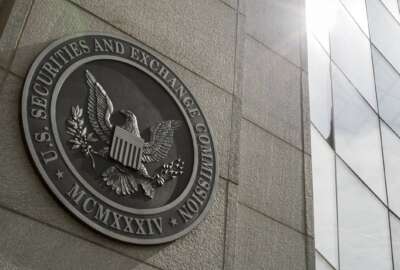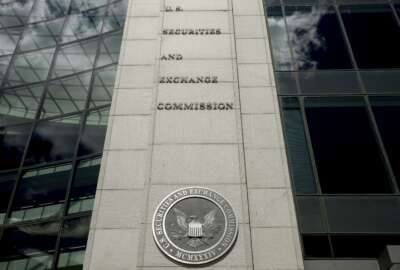Some advice so the SEC doesn’t get caught with its crypto pants down
The Securities and Exchange Commission (SEC) needs people with the expertise to oversee so-called crypto assets like bitcoin. The Government Accountability Office...
The Securities and Exchange Commission (SEC) needs people with the expertise to oversee so-called crypto assets like bitcoin. The Government Accountability Office (GAO) found that the SEC needs to update its workforce planning strategy in order to ensure it has the crypto experts it needs. For more, the Federal Drive with Tom Temin spoke with GAO’s Director of Financial Markets and Community Investment, Michael Clements.
Interview Transcript:
Tom Temin And let’s begin with what is the SEC’s role with respect to these cryptocurrencies, which actually are any of them not a scam, I guess, is the question.
Michael Clements In the extent that cryptocurrencies are securities, they would fall under U.S. securities law, for which SEC is responsible for enforcing. SEC has noted that many of these crypto assets are likely securities and therefore would fall under its remit.
Tom Temin And have they been doing that? To date, I guess they have. They have some crypto expertise on board. Did you find.
Michael Clements That is correct? We found that there’s approximately 120 staff out of the 4900 staff at SEC who are crypto experts or who spend a predominant amount of their time working on those issues.
Tom Temin And in general, does the SEC have a workforce planning strategy?
Michael Clements In 2016, we had made a recommendation to SEC to develop a workforce plan, in particular looking at skills gap analysis in 2019. SEC had taken steps to address that, in particular develop a competency survey to understand what the skills their staff had and also to conduct what are known as human capital reviews, to look at, okay, what skills do we need updating? What we did find is that the SEC had not updated its workforce plan. Its last workforce plan, Ram 2019, through 2022. So, if we recommended in this most recent report that they update that workforce plan.
Tom Temin Is there any indication that the staff that they have now on the crypto beat, let’s say, made any mistakes or have they missed anything? I mean, SEC famously missed the Madoff affair many years ago. That was not a crypto situation, but it was brought to the agency’s attention, and nothing happened. And so on and so forth. The rest is history. And then we had this FTX failure last year. A spectacular thing. Was the SEC on top of that?
Michael Clements The commission has been engaged in a fair amount of outreach with the industry to let them understand what their obligations are. The Commission has issued a number of guidance documents to the industry to let them know, okay, who needs to register and under what conditions, and we can follow on that the commission has taken enforcement actions. The Commission has brought over 130 enforcement actions against entities that have not registered in compliance with the securities laws.
Tom Temin Because these companies are selling basically investment instruments in something that actually doesn’t exist. It’s a hash somewhere on a piece of software hidden, you know, somewhere on the internet basically is what you’re investing in. But nevertheless, they have the mechanisms of investment as if it was a stock fair way to put it?
Michael Clements Correct. If the crypto asset meets the definition of a security, it is required to be registered in an exchange that is trading those crypto assets data we’ve registered. In many instances, these crypto assets fall under what would be considered an investment contract, which is a type of security. And again, SEC in 2019 provided a framework for industry participants to be able to look at their crypto asset to decide, is this a security or not?
Tom Temin And just briefly, do you have any sense of the industry itself? I mean, is it like electric cars where there’s a bunch of people jumping in in a year, most of them will be bankrupt and disappear and there’ll be a couple left standing, maybe Tesla, maybe 1 or 2 others. Is that how it is in crypto? Or, you know, Bitcoin will still be there and the rest of them will fall away.
Michael Clements I don’t know if I want to predict who might be here in five years or so. At this point, Bitcoin does have the most staying power, and in recent days, in fact, the commission approved several spot Bitcoin exchange traded funds for folks who perhaps one exposure to bitcoin but don’t want to actually hold the Bitcoin themselves.
Tom Temin Sure. We’re speaking with Michael Clements, director of financial markets and community investment at the Government Accountability Office. And so, what have you recommended for SEC.
Michael Clements So in the December report, we have three recommendations. First, as I mentioned, to update its workforce plan aligned plan with its strategic plan, which runs from fiscal year 22 through 26. Second, SEC has set up an office which is dedicated to crypto and really technology policy at large, which is called its FINHUB, with two recommendations there. First is to formalize its policies and procedures around its controls just to make sure that it’s in fact achieving its objectives. And then secondly, to develop performance goals, measures that it had not done so at this point. Again, just to help make sure that it’s achieving what is intended to achieve.
Tom Temin Yeah. These are the basics that you would have with any program that an agency initiates.
Michael Clements That is correct FINHUB is a relatively new entity. It started out 2018 within the Division of Corporation Finance. It became a separate standalone office 2020. Some of these foundational elements are still needed types of policies and procedures, and performance goals.
Tom Temin And by the way, which areas of Congress tend to be interested in the SEC and what it’s doing? And with Bitcoin? Is there a correspondence between the agencies that oversee SEC and also have to do with the cryptocurrencies themselves?
Michael Clements That’s correct. So, in Congress, the two main committees would be in a House Committee on Financial Services. In fact, we did this work for the chairman McHenry of that committee and also in the Senate Banking Committee that said, in some cases, these crypto currencies and crypto assets could be considered commodities. In fact, Bitcoin is generally considered to be a commodity, in which case also the agriculture committees in both the House and Senate are involved.
Tom Temin Interesting. So, it’s both a financial investment instrument, a security, and it’s also a commodity.
Michael Clements In the case of Bitcoin. The general thought is that as a commodity, there are other coins in crypto assets in general that are considered to be securities.
Tom Temin And I guess we assume this, but I should ask it directly. There is special technological information you need to know to be able to oversee what’s going on in Bitcoin, because there is no physical commodity. I suppose in theory you could get a truck full of pork bellies. Not that anyone ever does, but somewhat maybe. Maybe a processing plant does. But no one ever takes physical possession of anything. It doesn’t exist in time and space.
Michael Clements That’s our sense that given the complexity of the technology, that it’s important for, again, staff to have this expertise. In fact, that was one of the driving forces for SEC setting up the FINHUB office in the first place.
Tom Temin And did the SEC generally agree with the recommendations you made, the three recommendations?
Michael Clements Yeah. So, the SEC agreed and has committed to take action to address all three.
Copyright © 2025 Federal News Network. All rights reserved. This website is not intended for users located within the European Economic Area.
Tom Temin is host of the Federal Drive and has been providing insight on federal technology and management issues for more than 30 years.
Follow @tteminWFED






